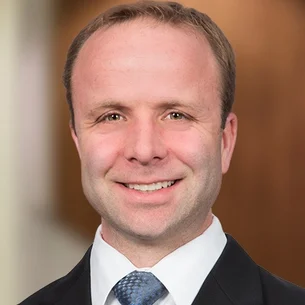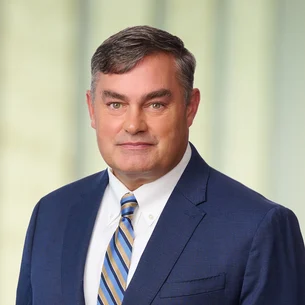A Look Ahead: Key Intellectual Property Legal Topics in 2024
What should in-house counsel be on the lookout for in 2024? As we begin a new year, our attorneys look ahead at intellectual property topics they expect will be trending in 2024. They cover areas including life sciences, litigation, post-grant proceedings, artificial intelligence, design patents, and trademarks.
LIFE SCIENCES
In 2023’s Amgen v. Sanofi case, the United States Supreme Court determined that several of Amgen’s patent claims to a class of antibodies were invalid for lack of enablement.

Jeff Hsi, Shareholder, Pharmaceutical Practice:
“Generally, US Examination of claims in the biotech and pharmaceutical industry will likely see some heightened scrutiny for meeting the 35 USC 112 enablement and written description requirements for patentability. And hopefully, the CAFC will provide more clarity and establish further precedence for the means plus function type claim format, both generally and specifically in the antibody technology space.”
In 2023’s In re Cellect, the Federal Circuit affirmed the PTAB’s cancellation of claims for obviousness-type double patenting over reference claims from earlier expiring patents in the same family in which differences in expiration dates were due solely to patent term adjustment.
 Jonathan Roses, Shareholder, Pharmaceutical Practice:
Jonathan Roses, Shareholder, Pharmaceutical Practice:
“I would not at all be surprised if this goes up to the Supreme Court. And I think the impact of Cellect, which was nominally more of a tech/medical device case, on life sciences patents is enormous. There is a lot of confusion as to how this applies, what patents might be at risk after the In re Cellect decision. This is going to be a very active area where I think we’re going to be providing a lot of advice to clients, and it will be essential to be on the lookout for these issues.”
One area that received a lot of attention in 2023 was the drug pricing scheme and the Inflation Reduction Act, which essentially incentivized the development of biologics over small molecules by allowing price controls to kick in after only nine years, compared to 13 years for biologics.
 Dan Young, Shareholder, Biotechnology Practice:
Dan Young, Shareholder, Biotechnology Practice:
“On the patent side, one thing we’ll be expecting to see is just how this plays out. There are a number of cases challenging the legislation, but we’ll be seeing and interacting with the companies that we work with. We may shift priorities around the different assets that they protect, and will certainly look at their patent strategy to ensure that values and priorities remain aligned with the pipeline plans to the extent that they’re going to be shifting in view of this legislation.”
Another issue that grabbed headlines was the Biden Administration's Executive Order pertaining to new technologies and products that are developed with support from the US Government, which must be manufactured in the United States whenever feasible and consistent with applicable law.
 Rob Sahr, Shareholder, Biotechnology Practice:
Rob Sahr, Shareholder, Biotechnology Practice:
“This is something to really pay attention to because that obligation carries forward to any partners of an entity that developed an invention under a federally funded project. They carry the obligation to manufacture products that will be sold in the United States. And the government will now be more closely tracking that information through utilization reports. The executive order also urges agencies to consider whether there are exceptional circumstances, such that the agencies can require in their funding award that not just products sold in the US will be manufactured in the US, but products sold anywhere in the world be manufactured in the US. That’s a significant expansion and something people should be paying attention to when they’re seeking federal funding.”
LITIGATION
The International Trade Commission, ITC, may see a rise in Section 337 non-patent claims following their institution of a controversial complaint based solely on non-patent claims.
 Libbie DiMarco, Shareholder, Litigation Practice:
Libbie DiMarco, Shareholder, Litigation Practice:
“Respondents that are named in ITC complaints in 2024 should take a hard look at whether you can file a request not to institute, or a request to narrow the complaint in some way. It is rare for the ITC to deny institution, but it’s not unprecedented and the ITC did exactly that in this case, investigation 1380 – it even denied entirely as to one specific respondent. I think if you can find a strong argument or look for a hole in the complaint, there’s always a chance that you’re going to be successful.”
The Unified Patent Court, UPC, and the European Unitary Patent came into full force on June 1st, 2023, and is an area that needs to be followed closely in 2024.
 Zach Piccolomini, Shareholder, Electrical & Computer Technologies Practice:
Zach Piccolomini, Shareholder, Electrical & Computer Technologies Practice:
“It will be interesting to see how these litigations start to run to completion in 2024. There are questions about how patent friendly the UPC will be. There are some assumptions that it will be patentee friendly, but we don’t know. Decisions that will come down in 2024 will help us to tailor our review and advice for clients and for use of that system. Related to the UPC decisions is the patents that can be asserted in the Unified Patent Court. So there’s regular jurisdictional patents, as well as the unitary patent, and it’ll be interesting to see how the unitary patent continues to play out in the UPC.”
POST-GRANT PROCEEDINGS
PTAB practitioners are eagerly awaiting an updated rules package. Following the release of an uncharacteristically large proposal in 2023, industry experts expect to see a smaller set of proposals and much more clarity.
 Scott McKeown, Shareholder, Post-Grant Proceedings Practice:
Scott McKeown, Shareholder, Post-Grant Proceedings Practice:
“A lot of the proposals that I expect to be in any proposed rule package will be relatively modest and will be codifying practices, frankly, that are already ongoing, and which clients are already dealing with when it comes to whether a petition will be discretionarily denied based upon a parallel litigation. What are those considerations? The director issued a memo about a year or so back, which everybody has been following. So I don’t expect anything to change radically. It’s just a matter of getting those practices committed to rules.”
ARTIFICIAL INTELLIGENCE
Artificial intelligence touched just about every field in 2023, and that includes robotics.
 John Harmon, Shareholder, Mechanical Technologies Practice:
John Harmon, Shareholder, Mechanical Technologies Practice:
“We basically tell our clients, ‘file early, file often.’ So if you have an idea that you think is a game-changer, it may be the future of your company, you should file earlier rather than later. That said, you do need to have an idea of ‘What’s the problem I’m addressing? How am I addressing it?’ For instances where you're applying AI to a problem, you really have to drill down into the details, because you can't just say, ‘I have AI, and I get a patent.’ It does not happen that way.”
One key issue concerns President Biden's Executive Order on Artificial intelligence, which was issued to begin the process of setting standards for the development and use of AI.
 Ed Russavage, Shareholder, Electrical & Computer Technologies Practice:
Ed Russavage, Shareholder, Electrical & Computer Technologies Practice:
“We are very interested in this because part of this approach focuses on the IP issues, including some patent and copyright issues. The order directs various actions to be taken by agencies, including the USPTO and the Copyright Office. So this order will definitely have impacts in 2024 on patent inventorship, patent eligibility, and with respect to copyrights, a scope of protection for works produced using AI and the treatment of copyrighted works in AI training.”
DESIGN PATENTS
In 2023, the design patent community was impacted by the Columbia Sportswear case, which touched on the importance of choosing a good title in a design patent application. In a case of first impression, the Federal Circuit limited the type of comparison prior art that can be used in an infringement analysis. The Federal Circuit held that, to qualify as comparison prior art, the prior design must be directed to the same type of object that was identified in the patent title.
 Jennifer Wang, Shareholder, Mechanical Technologies Practice:
Jennifer Wang, Shareholder, Mechanical Technologies Practice:
“It’s important to be more strategic about thinking, “What are the types of products that you actually care about from a commercial perspective?” If you’re in a certain industry, do you really care about covering completely irrelevant industries that don't compete with you? The question and advice to inventors and companies is: think hard about what you are trying to cover with this design? What types of categories of products are most important? And then we can tailor a title accordingly. We’re not going to be too narrow, we’re not going to be too broad, but something just in the middle so that you get good protection, but you’re also less vulnerable to a validity issue.”
TRADEMARKS
In 2023, in the Jack Daniels case, the US Supreme Court continued to explore the balance between free expression under the First Amendment and trademark protection. In a unanimous decision, the Court sided with mark-owner Jack Daniels in its legal fight with VIP Products, a dog toy maker whose toy parodied the storied whiskey brand. The Court held that VIP Products’ use of the mark BAD SPANIELS and related trade dress was not automatically protected by the so-called Rogers v. Grimaldi doctrine or the First Amendment.
 John Strand, Shareholder, Trademark & Copyright Practice:
John Strand, Shareholder, Trademark & Copyright Practice:
“The First Amendment can come into play on whether there’s a commentary and whether there is some kind of parody happening with regard to the name. But if it's being used as a mark, that just becomes part of the analysis of likelihood of confusion, and the First Amendment doesn’t automatically protect the right to use that mark if it’s going to lead to a likelihood of confusion in the marketplace. The Court’s decision in Elster will be indicative of where this line between trademark and First Amendment is going.”
On November 1, 2023, the US Supreme Court heard oral arguments in Vidal v. Elster, which deals with a provision of the Lanham Act regarding registration of trademarks that include the name of a living individuals without his or her consent. The Court will decide whether the USPTO violated Steve Elster’s free speech rights when it denied him a registration for the expression, “TRUMP TOO SMALL” for t-shirts. How might this be decided in 2024?
 John Welch, Counsel, Trademark & Copyright Practice:
John Welch, Counsel, Trademark & Copyright Practice:
“It’s very straightforward. The justices were very skeptical about how this has any impact on free speech, because after all, even if [the Respondent] doesn’t get a registration, he still can go ahead and sell his t-shirts anyway. The justices were also concerned with prohibiting an individual from controlling his or her own name. In other words, why should an individual not be able to stop someone from using his or her name on a commercial product?”